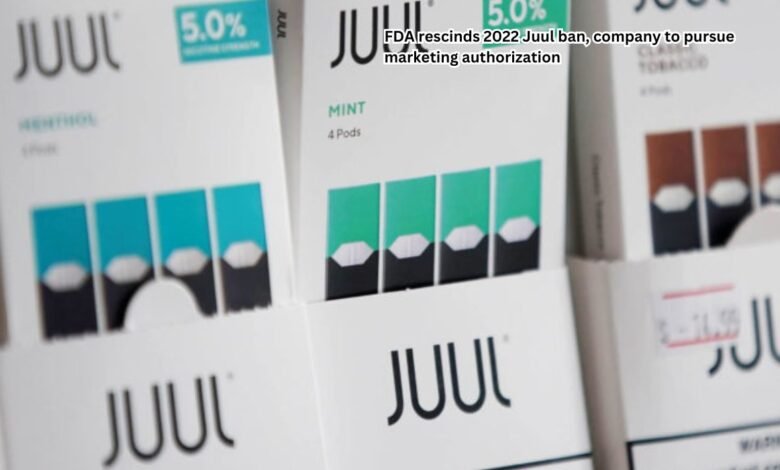FDA rescinds 2022 Juul ban, company to pursue marketing authorization
FDA rescinds 2022 Juul ban, allowing the company to pursue marketing authorization. Learn about the latest developments.

FDA rescinds 2022 Juul ban: In 2022, the U.S. Food and Drug Administration (FDA) imposed a ban on JUUL products, primarily driven by growing health concerns and the rising popularity of vaping among teenagers. The decision marked a significant regulatory action aimed at addressing public health issues associated with e-cigarettes and vaping devices. Below are the key reasons behind the ban:
- Health Concerns Related to Vaping: The FDA raised alarms over the potential health risks posed by e-cigarettes, including respiratory issues, addiction, and the presence of harmful chemicals. Reports of severe lung illnesses linked to vaping heightened these concerns.
- Rising Popularity Among Teenagers: JUUL products became increasingly popular among teenagers, leading to widespread use in high schools and middle schools. The sleek design and appealing flavors of JUUL pods were cited as major factors contributing to their appeal to minors.
- Regulatory Actions and Public Response: In response to the escalating use of JUUL among young people, the FDA intensified its scrutiny and enforcement actions. The agency issued warnings and took steps to restrict the sale of flavored e-cigarettes that were particularly attractive to youth.
Quoting from an FDA statement, “The surge in youth use of e-cigarettes, driven by JUUL and other products, has caused significant public health concern. We are committed to taking appropriate actions to protect the health of our nation’s children.”
The timeline of events leading up to the ban can be summarized as follows:
| Year | Event |
|---|---|
| 2018 | FDA launches investigation into JUUL’s marketing practices and youth appeal. |
| 2019 | FDA issues warning letters and fines to JUUL for marketing violations. |
| 2020 | FDA bans the sale of flavored e-cigarettes, excluding menthol and tobacco flavors. |
| 2022 | FDA announces a comprehensive ban on JUUL products. |
FDA’s Decision to Rescind the Ban
The FDA’s recent decision to rescind the ban on JUUL products marks a significant shift in the regulatory landscape for e-cigarettes. Several pivotal factors influenced this decision, starting with the new scientific evidence presented by JUUL Labs. This evidence aimed to address the initial health and safety concerns that led to the 2022 ban. JUUL’s updated research data demonstrated a more comprehensive understanding of the potential risks and benefits associated with their products, providing the FDA with a stronger basis for reconsideration.
Another critical element in this decision was JUUL’s modifications to their product formulations and marketing strategies. The company has implemented changes to reduce the appeal of their products to minors, such as altering flavor profiles and packaging designs. Additionally, JUUL has strengthened their marketing practices to ensure that their advertising does not target youth audiences, thereby aligning more closely with the FDA’s regulatory expectations.
Legal and financial pressures also played a role in the FDA’s decision. JUUL faced significant legal challenges and potential financial repercussions following the 2022 ban. These pressures likely expedited their efforts to comply with FDA regulations and present a more robust case for their products’ safety and efficacy. The company’s commitment to addressing these issues demonstrated a proactive approach that the FDA found noteworthy.
In an official statement, the FDA explained their rationale for rescinding the ban: “After reviewing the new evidence and considering JUUL’s revised product formulations and enhanced marketing strategies, we believe that the company has made substantial progress in addressing our concerns. This decision reflects our commitment to balancing public health interests with the need to provide adult smokers with safer alternatives to combustible tobacco products.”
Overall, the FDA’s decision was influenced by a combination of scientific evidence, product and marketing changes, and external pressures. These factors collectively underscored JUUL’s efforts to meet regulatory standards and reinforce their position in the market.
JUUL’s Plan to Pursue Marketing Authorization
Following the rescindment of the 2022 ban by the FDA, JUUL Labs has articulated its commitment to securing marketing authorization for its products. The cornerstone of this endeavor will be the submission of a comprehensive Pre-Market Tobacco Application (PMTA). This application will serve as JUUL’s primary vehicle to demonstrate the safety and effectiveness of their e-cigarettes and vaping products.
To navigate the intricate and demanding PMTA process, JUUL will have to meticulously address several critical components:
- Product Characterization: Detailed descriptions of the product’s design, ingredients, and manufacturing process.
- Health Impact Studies: Robust scientific data illustrating the health effects of their products on both users and non-users.
- Behavioral Studies: Examination of how the product impacts smoking behaviors, including any potential to aid in smoking cessation.
- Youth Access and Appeal: Strategies and evidence to mitigate the product’s appeal to minors, including marketing practices and product design modifications.
- Post-market Surveillance: Plans for ongoing monitoring and reporting of product performance and safety once it is on the market.
The process involves rigorous scrutiny by the FDA to ensure that the benefits of the product to adult smokers outweigh the risks to public health, particularly concerning youth usage. JUUL has pledged to adhere to these stringent standards, with a spokesperson stating, “We are committed to fully complying with the regulatory requirements to demonstrate the public health benefits of our products. Our priority is to ensure that our products are used by adult smokers looking for an alternative to combustible cigarettes, not by youth.”
By addressing these critical areas, JUUL aims to not only meet but exceed the expectations set forth by the FDA, positioning themselves as a responsible leader in the e-cigarette industry.
Implications for Consumers and the Vaping Industry
The FDA’s decision to rescind the 2022 ban on JUUL products and the company’s pursuit of marketing authorization carry significant implications for both consumers and the broader vaping industry. This regulatory shift could have profound effects on public health, influence the strategies of other e-cigarette companies, and shape consumer reactions and market trends.
Potential Impact on Public Health: The FDA’s decision may lead to increased scrutiny on the health effects of vaping products. Public health experts are likely to closely monitor any associated risks or benefits, particularly concerning the youth population. The decision also underscores the importance of rigorous scientific evidence in the regulatory process, potentially setting a precedent for future assessments of e-cigarette products.
Influence on Other E-Cigarette Companies: The FDA’s move could serve as a benchmark for other e-cigarette companies seeking market authorization. Companies may now be more inclined to invest in comprehensive scientific research and compliance measures to meet regulatory standards. This could lead to higher quality and safer products in the market, ultimately benefiting consumers.
Consumer Reactions and Market Trends: Consumer reactions to the FDA’s decision are mixed. Some see it as a validation of JUUL’s efforts to provide a less harmful alternative to traditional smoking, while others remain skeptical about the long-term health effects. Market trends suggest a potential uptick in the popularity of JUUL products, influenced by renewed consumer confidence and marketing strategies. However, competition remains stiff, with other major brands continuously innovating to capture market share.
- From Smriti Irani to Rajeev Chandrasekhar— 13 Union Ministers who lost 2024 Lok Sabha elections
- BJP storms Odisha, set to end Naveen Patnaik’s 24-year hold on state
- Election Result 2024 | Who is Forming The Government NDA or I.N.D.I.A.?
Comparison of JUUL Products with Major E-Cigarette Brands
| Brand | Product Range | Nicotine Content | Unique Features |
|---|---|---|---|
| JUUL | Pods, Devices | 3% – 5% | Salt-based nicotine, USB charging |
| Vuse | Cartridges, Devices | 1.5% – 5% | Variety of flavors, quick-charge technology |
| NJOY | Pods, Disposables | 2.4% – 5% | Wide distribution, easy availability |
| blu | Pods, Cartridges, Disposables | 0% – 4.5% | Affordable, multiple nicotine strengths |
Consumer Sentiments:
- Increased confidence in regulated products
- Concerns over long-term health effects
- Preference for brands with scientific backing
- Demand for variety in flavors and nicotine strengths
Overall, the FDA’s decision to rescind the JUUL ban and the company’s subsequent pursuit of marketing authorization could lead to a more regulated and scientifically-backed vaping industry. This may ultimately benefit consumers by providing safer and higher-quality products, although the long-term public health implications will require ongoing monitoring and research.



